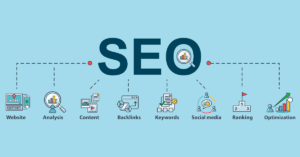Search Engine Optimization (SEO) continues to evolve year after year, but one thing remains constant — small mistakes can cost you big in rankings. As Google’s algorithms become more intelligent and user-focused, marketers and website owners must stay vigilant. Avoiding common SEO mistakes is essential if you want to rank higher, drive quality traffic, and improve your website’s visibility in 2025.
Let’s dive into the top 5 SEO mistakes you should absolutely avoid this year and beyond.
Table of Contents
Toggle1. Ignoring Search Intent
What is search intent? It’s the reason behind a user’s query — are they looking to learn something, make a purchase, compare products, or find a specific website?
Why It’s a Mistake:
Many website owners stuff their pages with keywords without considering whether the content actually satisfies the user’s intent. As a result, users bounce off the page quickly, which hurts your rankings.
How to Fix It:
-
Classify your keywords into Informational, Transactional, Navigational, and Commercial Investigation.
-
Match content type with user intent (e.g., use blog posts for informational keywords, product pages for transactional).
-
Use tools like Google Keyword Planner and check the top 10 search results to understand what Google believes users want.
✅ Example:
If someone searches “best digital cameras 2025”, they’re looking for comparisons and reviews — not a product page.

2. Poor On-Page Optimization
Even in 2025, on-page SEO still matters — a lot. Many websites overlook basic elements such as title tags, meta descriptions, heading hierarchy, and internal linking.
Why It’s a Mistake:
Without proper on-page structure, search engines struggle to understand your content. Poor formatting also turns off readers.
How to Fix It:
-
Use Yoast SEO or Rank Math to optimize title tags, meta descriptions, and content structure.
-
Make sure each page has:
-
A unique H1 heading
-
Well-structured H2 and H3 subheadings
-
Relevant keywords placed naturally (but not overstuffed)
-
-
Include internal links to related blog posts and external links to trusted sources.
✅ Pro Tip:
Keep your title tags under 60 characters and your meta descriptions under 160 to ensure they display properly in search results.
3. Slow Website Speed and Poor Mobile Optimization
With Google’s Core Web Vitals being a confirmed ranking factor, speed and mobile performance are more important than ever.
Why It’s a Mistake:
-
53% of mobile users leave a site if it takes more than 3 seconds to load.
-
Google now prioritizes mobile-first indexing, meaning your mobile site is what gets ranked.
How to Fix It:
-
Use PageSpeed Insights or GTmetrix to test your speed.
-
Optimize images (use WebP format, compress files).
-
Minimize CSS/JavaScript and leverage browser caching.
-
Choose a mobile-friendly theme and test your site on multiple devices.
✅ Tools to Use:
-
Google Lighthouse
-
Cloudflare CDN
-
LiteSpeed Cache plugin for WordPress
4. Not Creating High-Quality, Engaging Content
Content is (still) king in 2025 — but only if it’s valuable. Google rewards websites that offer in-depth, original, and helpful content.
Why It’s a Mistake:
Thin content, duplicate pages, and keyword stuffing are easy ways to get penalized. Many blogs post frequently but without depth or user value.

How to Fix It:
-
Focus on topic clusters, not just isolated keywords.
-
Use AI-powered SEO tools like Surfer SEO or Frase.io to build better outlines.
-
Write long-form content (800–2000 words) with actionable takeaways, visuals, and examples.
-
Incorporate videos, infographics, or interactive content to keep users engaged.
✅ Content Tip:
Answer “People Also Ask” queries from Google in your content to improve visibility in SERP snippets.
5. Not Tracking SEO Performance
SEO without tracking is like sailing without a compass. Many marketers put in effort but fail to measure what’s working — or what isn’t.
Why It’s a Mistake:
Without analytics, you miss opportunities to scale successful pages, fix underperforming ones, and improve ROI.
How to Fix It:
-
Set up Google Search Console and Google Analytics 4 to track impressions, clicks, bounce rates, and conversions.
-
Monitor your rankings weekly with tools like SEMrush, Ahrefs, or Ubersuggest.
-
Set clear SEO goals (e.g., organic traffic growth, keyword position gains) and adjust strategies based on data.
✅ Pro Tip:
Use event tracking to measure content interactions (like video plays or downloads) and optimize pages accordingly.
Final Thoughts
SEO in 2025 is no longer about gaming the system; it’s about aligning with user experience, relevance, and technical precision. Avoiding these common SEO mistakes can dramatically improve your website’s visibility, authority, and rankings.
Whether you’re a digital marketer, business owner, or blogger, staying ahead in SEO requires consistent learning and adaptation. Focus on user intent, create valuable content, optimize your technical foundation, and measure your progress — and you’ll stay one step ahead of your competition.

Need help optimizing your website for SEO in 2025?
📩 Contact us today for a free SEO audit and custom growth plan.
Would you like me to also prepare:
-
✅ Yoast SEO meta tags (Title, Description, Slug)?
-
✅ 3 royalty-free images for the blog?
-
✅ Internal links suggestion to your other blog posts?
Let me know and I’ll add them right away
